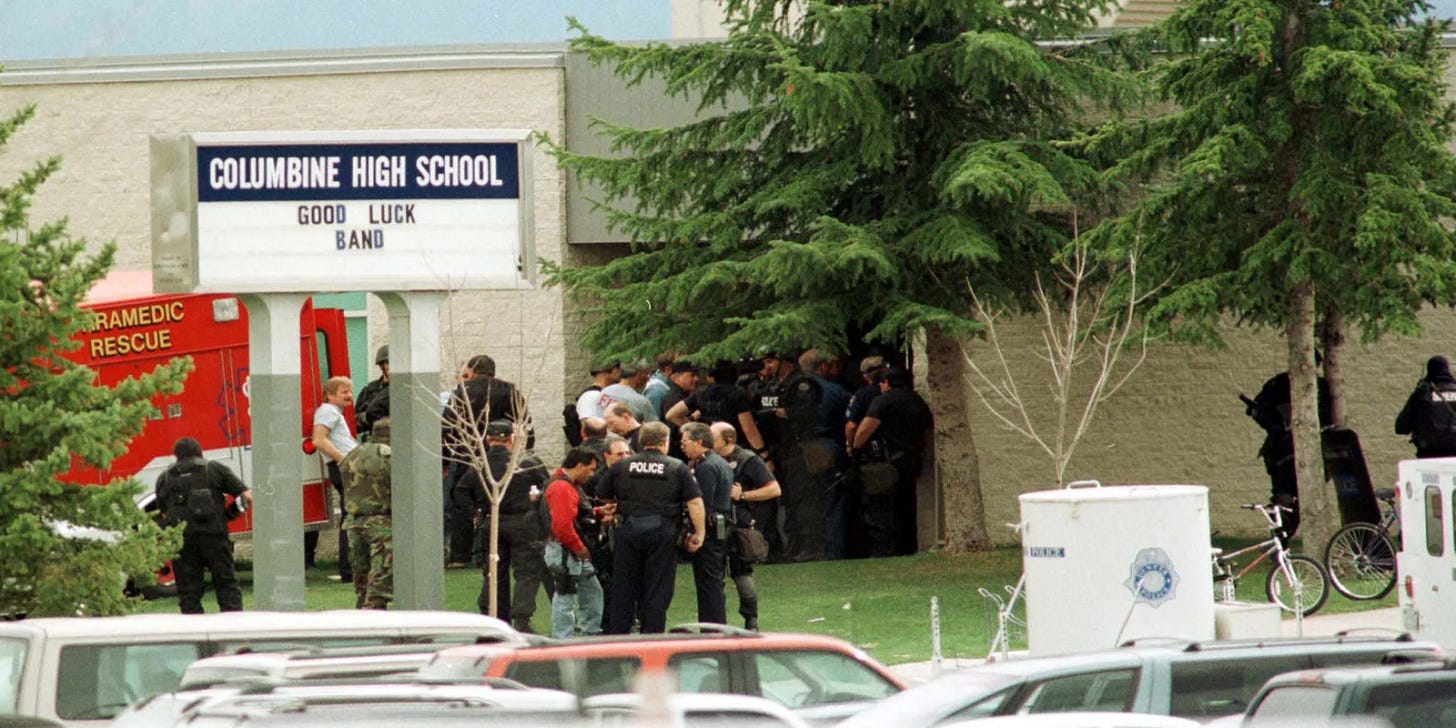Here is a button where you can subscribe to this newsletter now, if you have not previously done so. I do hope that you enjoy it.
One of my sons got in trouble at school this week. It was minor trouble, nothing-to-be-concerned-about trouble, an offense that, if we would have heard about later rather than having his teacher call us about, we wouldn’t have thought twice about. But the fact remains that the teacher did call. She handled it well, we were glad she called, we weren’t mad at him, it was really no big deal. Still: She did call.
So: Trouble. The biggest misconception about me early in my career—by “early,” I mean “shortly after Deadspin launched,” which was the first time nearly anyone had ever seen my name in the first place—was that I was some sort of troublemaker, that I came barreling into the media world wanting to burn it all down. Part of this was because Deadspin was associated with the Gawker Media network, whose mothership site had most of the New York City media scene pulling its hair out (though I’d modeled my site much more after Mark Lisanti’s Defamer), and part of it was because the newspaper model started to unravel most dramatically right as Deadspin’s ascendance began. This led people to think that I was a far more adversarial personality than I am. (When I showed up for the infamous “Costas Now” appearance, Bob Costas seemed legitimately surprised I didn’t show up in a spiked leather jacket and mohawk, grabbing my crotch and screaming, “Screw you and your media!” at him.) I wanted Deadspin to be a smart site with a specific, uncompromised point of view, but the goal was never to be nihilist or recklessly provocative. I would have never wanted that, because that is not who I am or who I have ever been. Because, deep down, I don’t want people to hate me. And I think that’s seeded in a fundamental fact from my childhood: I really, really didn’t want to get in trouble.
This is not the best quality for a journalist to have, and it’s something I wrestle with still today. (I’ve ultimately made peace with it by being comfortable with the right kinds of people hating me.) But a person is who a person is … and I am a rule follower. When I was a kid, I was always scared, and also a little envious, of the kids who got in trouble all the time, who were forever eager to tweak, and push, and bend the rules until they snapped. How could they just walk the world around like that? Their only concern was with whether or not they got caught; there was no guilt or angst or inner conflict. Getting caught? That was the least of my concerns. Getting caught would have been fine. Those rare times that I did something I wasn’t supposed to, when I did something that really could get me in trouble, getting caught felt like a relief—a blessed release from how shitty I had been feeling for doing something wrong in the first place.
This is surely connected to the sort of self-pressure a childhood high-achiever, with the elevated familial expectations that come with that, puts on himself in the first place; to this day, I am loathe to dwell on any sort of personal or professional setbacks when they happen, opting instead to just keep moving forward, focusing on the delusional-but-still-helpful Power of Positive Thinking. But I’m also from a family of institutionalists, people who believe, in their heart of hearts, that if you try to do the right thing, if you work as hard as you can, if you keep your head down and just focus on what’s in front of you, you will succeed in life, or at least put yourself in the best position to. Whether this is true or not—and there are many reasons to think it’s potentially quite caustic and destructive, not to mention blinkered by one’s own privilege—is beside the point: It has been so core to my and my family’s belief system for so long that it is inextricable from my personality. Getting in trouble is a violation of that belief system. The Midwesterner I am at my core will always just find it it inherently selfish—deciding that your own happiness is more important than everybody else’s.
I do not claim all of this to be some sort of immutable truth, or even a societal positive: Lord knows how much positive change in this world came as a result of what John Lewis famously coined “good trouble.” I can just simply tell you that the idea of “being in trouble” is something that terrifies me to my core, still today. My most common dream is not of being chased by a dragon, or having to take a test I haven’t studied for—it’s being accused of a crime. I never know in the dream if I’ve actually committed the crime or not. I just know that everyone believes I did. That’s the scary part.
Needless to say, this led to me successfully avoiding much trouble when I was young. I didn’t drink in high school, I was always home when my parents told me to be, I never even got detention. It is telling that the one time I ever even slightly got in trouble remains one of my most vivid childhood memories. My freshman year of high school, we had a student teacher named Mr. Doateman who always took a lot of pride in telling us how Republican his politics were, how much he admired Ronald Reagan and George H.W. Bush. (He claimed his dad was friends with Indiana’s own Dan Quayle, but we always assumed he made that up.) I didn’t have a fully formed politics of my own at the time, but I’d read enough Rolling Stone and Roger Ebert to believe that Reagan was bad, so I would jokingly push back on him with whatever political argument I’d read in a magazine that day before and memorized without really understanding. One day, I got to class before everyone else, sneaked up to the chalkboard, wrote “Mr. Doateman ❤️❤️❤️ Barbara Bush” in big white letters and waited for the class to come in and appreciate my comedic genius. When Mr. Doateman arrived and the class cracked up, he was, to my surprise, furious. His face went beet red, and he began to shake. He then kicked a chair over and screamed at me. “Will! That is unacceptable! Get to the principal’s office, RIGHT NOW.”
All my funny-guy bravado evaporated instantly. I ran out to the hall before anyone could see me start crying. I walked to Dr. Salmela’s office as a doomed man, a prison officer behind me, announcing my presence as I approached the instrument of my demise.
I can still, this second, feel the wet heat of shame on the back of my neck.
When I told the principal what happened, trying to keep my composure but convinced that my academic career was going to end right then and there, that I’d never go to college, that my family would deem me a failure and unworthy of their high expectations, he laughed. “You never know what you’re getting with student teachers,” he said. “Don’t worry about it. It’s fine.” He let me stay in his office and talk with him about baseball until class period ended to calm me down. It was the worst trouble I ever got in in high school. It was nothing.
I will nevertheless regret writing that on the chalkboard the rest of my life.
My son, this week, had a similar reaction. (His offense was roughly as criminal as mine was.) The teacher called, as it turned out, not because she felt we needed to be informed of his malfeasance, but because he was so upset that a teacher believed he had done something wrong that she felt she needed to call to help chill him out. We let him know it was fine, that he made a (incredibly minor) mistake, that we weren’t mad at him, that we hope he learned a lesson from this whole incident that will serve him well in the future.
But he’s still rattled by it. I made a joke about it with him yesterday, and his face went pale. I suspect he will think about it as long as I thought about Mr. Doateman, so long that I will remember the unusual way he spelled his last name on my deathbed. That chalkboard, that hallway, that doomed walk … its dimensions in my mind remain as vivid and sharp today as they were more than 30 years ago.
As a parent, I do not want my children to get in trouble. I want them to do the right thing. I want them to make the correct decisions. I want them not to do anything that is going to in any way hinder their ability to thrive in life. I want them to be safe.
But I do not want them to be as scared of trouble as I was. I want them to push themselves, to stir the pot a bit, to challenge, to take risks, to have the freedom and confidence to stand up for what they believe in, to go against the grain, to even have a little bit of fun. I want them to make good decisions. But I don’t want them to be terrified of making a bad one. I want them to be willing to get in trouble from time to time. I want them to be themselves.
I will do my best to remember all this, too, when I find out and then ground the ever-loving shit out of them.
Here is a numerical breakdown of all the things I wrote this week, in order of what I believe to be their quality.
This Is the Most Exciting NBA Playoffs in Years, New York. Not just because of the Knicks.
The MLB Five Fascinations, MLB.com. Featuring this week: Jose Altuve, Cedric Mullins, Mason Miller, the “Maddux” and modern-day Whiteyballers.
Guy Ritchie Movies, Ranked and Updated, Vulture. Updated with The Ministry of Ungentlemanly Warfare.
How Excited Should You Be About These Fast Starters? MLB.com. I don’t even remember fast Cardinals starts.
My Weekly Power Rankings, MLB.com. No matter how many times you tell people, they still don’t get that I just write the Power Rankings, they are not in fact my personal Power Rankings. It makes for many amusing Monday mornings.
PODCASTS
Grierson & Leitch, we discussed “Civil War,” “Sasquatch Sunset” and “The People’s Joker.”
Seeing Red, Bernie and I would like to see some runs.
LONG STORY YOU SHOULD READ THIS MORNING … OF THE WEEK
“As Cardinals Seek More Public Money for Busch Stadium, Experts Balk,” Eric Berger, The Riverfront Times. God bless The Riverfront Times for being an alt-weekly that’s still out there doing exactly what an alt-weekly is supposed to do.
Also, today is the 25th anniversary of the Columbine massacre. My friend (and fellow member of the Illini Media Hall of Fame) Dave Cullen wrote a sad, disturbing foreword to his great book Columbine that was excerpted in The Atlantic.
Also, one more: In case you forgot just how terrible Trump was during the pandemic, here is a step-by-step reminder. I know we’ve all decided to memory-hole the pandemic, but to quote the writer, “In a sane country, it would disqualify him from ever again holding office.”
ONGOING LETTER-WRITING PROJECT!
This is your reminder that if you write me a letter and put it in the mail, I will respond to it with a letter of my own, and send that letter right to you! It really happens! Hundreds of satisfied customers!
Write me at:
Will Leitch
P.O. Box 48
Athens GA 30603
CURRENTLY LISTENING TO
“Sink Ya Teeth,” The Mysterines. I’m a longtime proselytizer of The Mysterines, and they have a new album coming out in June called “Afraid of Tomorrows.” I cannot wait. This song would have been a huge, huge hit in 1996.
Remember to listen to The Official Will Leitch Newsletter Spotify Playlist, featuring every song ever mentioned in this section.
Also, now there is an Official The Time Has Come Spotify Playlist.
Let’s. Go. Knicks.
Have a great weekend, all.
Best,
Will








I'm assuming this is also why you often talk about how you never miss deadlines. I'm a supply chain analyst and a common refrain in our world is that no one bothers us unless something is wrong. There is a negative connotation to that but I love it. You mean if I do my job and stay out of trouble people will leave me alone?
As someone raised elsewhere, I have an abiding affection and the deepest respect for Midwestern values.